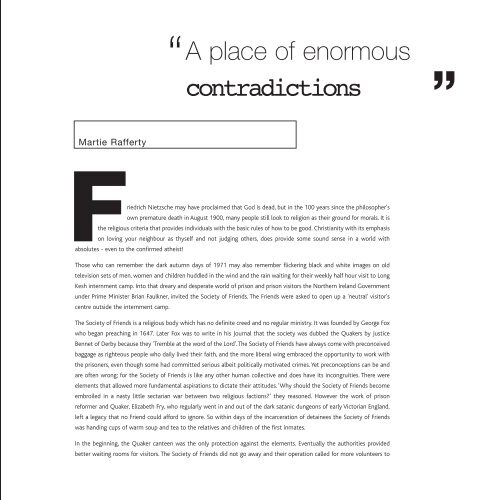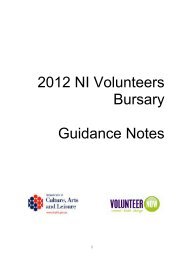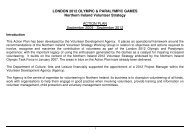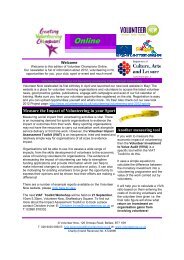Stories from the Edge - Volunteer Now
Stories from the Edge - Volunteer Now
Stories from the Edge - Volunteer Now
Create successful ePaper yourself
Turn your PDF publications into a flip-book with our unique Google optimized e-Paper software.
“A place of enormouscontradictions”Martie RaffertyFriedrich Nietzsche may have proclaimed that God is dead, but in <strong>the</strong> 100 years since <strong>the</strong> philosopher'sown premature death in August 1900, many people still look to religion as <strong>the</strong>ir ground for morals. It is<strong>the</strong> religious criteria that provides individuals with <strong>the</strong> basic rules of how to be good. Christianity with its emphasison loving your neighbour as thyself and not judging o<strong>the</strong>rs, does provide some sound sense in a world withabsolutes - even to <strong>the</strong> confirmed a<strong>the</strong>ist!Those who can remember <strong>the</strong> dark autumn days of 1971 may also remember flickering black and white images on oldtelevision sets of men, women and children huddled in <strong>the</strong> wind and <strong>the</strong> rain waiting for <strong>the</strong>ir weekly half hour visit to LongKesh internment camp. Into that dreary and desperate world of prison and prison visitors <strong>the</strong> Nor<strong>the</strong>rn Ireland Governmentunder Prime Minister Brian Faulkner, invited <strong>the</strong> Society of Friends. The Friends were asked to open up a 'neutral' visitor’scentre outside <strong>the</strong> internment camp.The Society of Friends is a religious body which has no definite creed and no regular ministry. It was founded by George Foxwho began preaching in 1647. Later Fox was to write in his Journal that <strong>the</strong> society was dubbed <strong>the</strong> Quakers by JusticeBennet of Derby because <strong>the</strong>y 'Tremble at <strong>the</strong> word of <strong>the</strong> Lord'.The Society of Friends have always come with preconceivedbaggage as righteous people who daily lived <strong>the</strong>ir faith, and <strong>the</strong> more liberal wing embraced <strong>the</strong> opportunity to work with<strong>the</strong> prisoners, even though some had committed serious albeit politically motivated crimes. Yet preconceptions can be andare often wrong; for <strong>the</strong> Society of Friends is like any o<strong>the</strong>r human collective and does have its incongruities. There wereelements that allowed more fundamental aspirations to dictate <strong>the</strong>ir attitudes. ‘Why should <strong>the</strong> Society of Friends becomeembroiled in a nasty little sectarian war between two religious factions?’ <strong>the</strong>y reasoned. However <strong>the</strong> work of prisonreformer and Quaker, Elizabeth Fry, who regularly went in and out of <strong>the</strong> dark satanic dungeons of early Victorian England,left a legacy that no Friend could afford to ignore. So within days of <strong>the</strong> incarceration of detainees <strong>the</strong> Society of Friendswas handing cups of warm soup and tea to <strong>the</strong> relatives and children of <strong>the</strong> first inmates.In <strong>the</strong> beginning, <strong>the</strong> Quaker canteen was <strong>the</strong> only protection against <strong>the</strong> elements. Eventually <strong>the</strong> authorities providedbetter waiting rooms for visitors. The Society of Friends did not go away and <strong>the</strong>ir operation called for more volunteers to
















